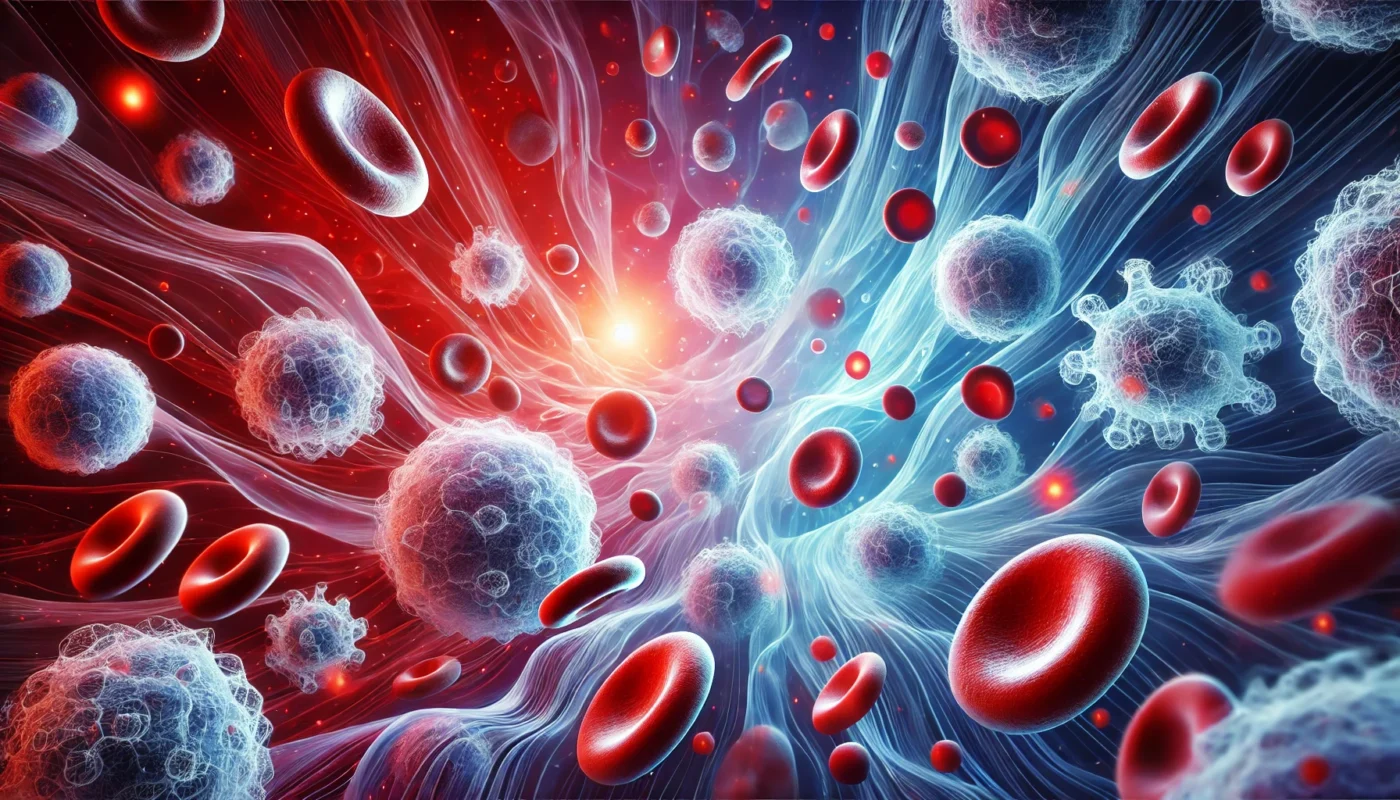White blood cells are the cornerstone of the body’s defense against infection and play a pivotal role in inflammation. These cells are primarily produced in the bone marrow and circulate through the blood and lymphatic tissues. There are several types of WBCs, each with specialized functions:
Neutrophils: The First Responders
Neutrophils are the most abundant type of white blood cells and serve as the body’s first line of defense against microbial infection. Upon encountering pathogens, they act rapidly to engulf and digest these foreign invaders. This process, known as phagocytosis, is crucial for neutralizing threats before they can spread. Neutrophils are particularly effective against bacteria and fungi, and their swift response is a key factor in controlling infections at their onset.
Lymphocytes: The Immune System’s Memory
Lymphocytes, which include B cells, T cells, and natural killer cells, are essential for the adaptive immune response. B cells are responsible for producing antibodies that target specific pathogens, while T cells destroy infected host cells and orchestrate the immune response. Natural killer cells target and destroy compromised cells, such as tumor cells or those infected by viruses. These cells not only help recognize and remember pathogens but also provide long-term immunity, ensuring that the body can respond more effectively to future exposures.
Monocytes and Macrophages: The Clean-Up Crew
Monocytes circulate in the bloodstream until they migrate into tissues, where they differentiate into macrophages. Macrophages are versatile cells involved in phagocytosis, engulfing and digesting cellular debris and pathogens. They also play a crucial role in alerting other immune cells to the presence of invaders, acting as a bridge between the innate and adaptive immune systems. Their ability to process and present antigens to T cells makes them integral to maintaining a robust immune response.
Eosinophils: Defenders Against Parasites
Eosinophils are primarily involved in combating multicellular parasites and certain infections. They release toxic granules that can destroy parasites and modulate the inflammatory response. Beyond their role in infection control, eosinophils are also implicated in allergic reactions, where they contribute to tissue inflammation and remodeling, sometimes leading to symptoms like asthma or dermatitis.
Basophils: The Histamine Releasers
Basophils are the least common type of WBC but play a significant role in allergic responses and asthma attacks. They release histamine and other mediators that contribute to inflammation and vasodilation. This release can lead to increased blood flow and permeability of blood vessels, facilitating the arrival of additional immune cells to the site of inflammation. Understanding their role is crucial for managing allergic conditions and understanding the inflammatory process.
You May Also Like: Walking and Its Impact on Inflammation

How Do White Blood Cells Cause Inflammation?
The process of inflammation is a complex cascade of events triggered when the immune system detects an injury or pathogen. This multifaceted response involves several key steps:
The Inflammatory Response: A Step-by-Step Process
Inflammation begins with the immune system’s recognition of harmful stimuli, such as pathogens or damaged cells. This recognition activates a cascade of events:
- Recognition of Harmful Stimuli: Specialized receptors on immune cells identify pathogens or damaged cells, triggering an alert.
- Activation of the Immune System: Once alerted, WBCs are recruited to the site of injury or infection, mobilizing the body’s defense mechanisms.
- Release of Inflammatory Mediators: Chemicals such as histamines, cytokines, and prostaglandins are released, increasing blood flow and the permeability of blood vessels. This facilitates the rapid transport of immune cells to the affected area.
- Elimination of Pathogens: Neutrophils and macrophages engulf and destroy pathogens, neutralizing the threat and preventing further damage.
- Resolution and Healing: After the threat is neutralized, inflammation subsides, allowing tissues to heal and restore normal function.
Acute vs. Chronic Inflammation: The Delicate Balance
While acute inflammation is a necessary and beneficial response, chronic inflammation poses significant health risks. Chronic inflammation occurs when the immune response is prolonged, and WBCs remain active beyond their intended purpose. This persistent activity can lead to tissue damage and has been linked to various chronic conditions, such as arthritis, heart disease, and diabetes. Understanding the difference between acute and chronic inflammation is essential for developing strategies to manage inflammatory diseases effectively.
The Role of Cytokines in Inflammation
Cytokines are small proteins released by cells that have a specific effect on the interactions and communications between cells. They play a critical role in regulating inflammation and the immune response. Pro-inflammatory cytokines promote inflammation and recruit immune cells to the site of injury, while anti-inflammatory cytokines work to resolve inflammation and promote healing. The balance between these opposing forces is crucial for maintaining health and preventing chronic inflammatory conditions.
Factors Influencing WBC Function in Inflammation
Several factors can significantly influence WBC function and the inflammatory response. Understanding these factors can help in developing strategies to modulate inflammation and maintain immune health:
Diet: Fueling the Immune System
Nutritional choices profoundly impact the immune system’s effectiveness. A diet rich in antioxidants, omega-3 fatty acids, and essential vitamins and minerals supports healthy inflammation levels. Foods like fruits, vegetables, fatty fish, nuts, and seeds provide the necessary nutrients to fuel immune cells and modulate inflammatory responses. On the other hand, processed foods high in sugar and unhealthy fats can exacerbate inflammation and compromise immune function.
Exercise: Enhancing Immune Resilience
Regular physical activity is a powerful tool for enhancing immune function and regulating inflammation. Exercise stimulates the production of anti-inflammatory cytokines, improves circulation, and boosts the body’s defense mechanisms. Engaging in moderate-intensity activities like walking, cycling, or swimming can help maintain a healthy immune system and reduce the risk of chronic inflammatory diseases.
Stress: The Silent Inflammation Trigger
Chronic stress is a significant contributor to inflammation and can suppress the immune system’s ability to function effectively. Stress triggers the release of hormones like cortisol, which, in excess, can promote inflammation and increase susceptibility to illness. Incorporating stress-reducing practices such as mindfulness, meditation, and yoga can help mitigate the adverse effects of stress on the immune system.
Sleep: The Restorative Power of Rest
Adequate rest is essential for optimal immune function and inflammation control. During sleep, the body undergoes critical repair processes, including the regulation of immune responses. Consistently getting 7-9 hours of quality sleep per night helps maintain a balanced immune system and supports the body’s ability to manage inflammation effectively.

Holistic Approaches to Support WBC Function and Manage Inflammation
Adopting a holistic approach to health can enhance WBC function and promote balanced inflammation. This approach encompasses various strategies that work synergistically to support the immune system:
Nutrition: Building a Foundation for Health
A balanced diet rich in anti-inflammatory foods can significantly support WBC function and overall immune health. Consider incorporating the following into your diet:
- Fruits and Vegetables: High in antioxidants and phytochemicals, they help combat inflammation and protect against oxidative stress.
- Fatty Fish: Salmon, sardines, and other fatty fish are rich in omega-3 fatty acids, which have potent anti-inflammatory effects.
- Nuts and Seeds: These are packed with healthy fats and antioxidants that support immune health and inflammation regulation.
- Whole Grains: Providing fiber and essential nutrients, whole grains help modulate inflammation and support digestive health.
Supplements: Enhancing Natural Defenses
Certain supplements have shown promise in supporting WBC function and reducing inflammation:
- Curcumin: Found in turmeric, curcumin has potent anti-inflammatory properties and can help modulate the immune response.
- Resveratrol: This compound, found in grapes and berries, has been shown to reduce inflammation and protect against oxidative stress.
- Probiotics: Beneficial bacteria that support gut health, probiotics play a crucial role in modulating the immune response and maintaining a healthy inflammatory balance.
Mind-Body Practices: Harmonizing Body and Mind
Stress management techniques can have a profound impact on regulating the immune system and inflammation:
- Meditation: Regular practice can reduce stress and inflammation, promoting mental clarity and emotional stability.
- Yoga: Combining physical movement, breathing exercises, and mindfulness, yoga promotes relaxation, flexibility, and immune function.
- Deep Breathing: Simple deep breathing exercises can encourage relaxation and reduce stress-induced inflammation, supporting overall health.
Lifestyle Modifications: Small Changes, Big Impact
Implementing certain lifestyle changes can support WBC function and inflammation management:
- Regular Exercise: Engaging in moderate physical activity helps maintain a healthy immune system and reduces the risk of chronic inflammatory conditions.
- Adequate Sleep: Strive for 7-9 hours of quality sleep per night to support immune function and promote recovery.
- Stress Reduction: Incorporate stress-reducing activities such as hobbies, socializing, and relaxation techniques to maintain emotional and physical health.

Conclusion
Understanding the role of white blood cells in inflammation is crucial for managing health and wellbeing. By adopting a holistic approach that includes balanced nutrition, regular exercise, stress management, and adequate sleep, you can support your immune system and maintain healthy inflammation levels. As always, consult with a healthcare professional before making significant changes to your health regimen. By integrating these practices into your daily life, you can optimize your body’s natural defenses and promote long-term health and wellness. Embracing this comprehensive approach not only enhances immune resilience but also empowers you to lead a vibrant, balanced life.
Further Reading:
High White Blood Cell Count: What to Know
Metabolic reprogramming of white blood cells controls inflammation in fat
white blood cells, inflammation, immune system, neutrophils, lymphocytes, macrophages, cytokines, chronic inflammation, diet and immunity, exercise and inflammation, stress management, holistic health, anti-inflammatory foods, immune health, wellness
Important Note: The information contained in this article is for general informational purposes only, and should not be construed as health or medical advice, nor is it intended to diagnose, prevent, treat, or cure any disease or health condition. Before embarking on any diet, fitness regimen, or program of nutritional supplementation, it is advisable to consult your healthcare professional in order to determine its safety and probable efficacy in terms of your individual state of health.
Regarding Nutritional Supplements Or Other Non-Prescription Health Products: If any nutritional supplements or other non-prescription health products are mentioned in the foregoing article, any claims or statements made about them have not been evaluated by the U.S. Food and Drug Administration, and such nutritional supplements or other health products are not intended to diagnose, treat, cure, or prevent any disease.

